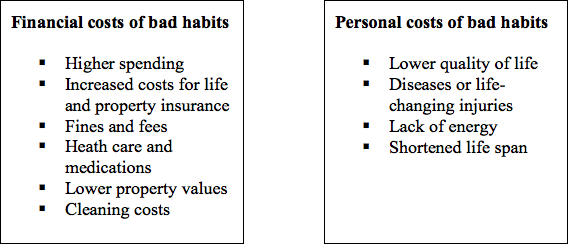
by Marie Engen, Boomer & Echo
Special to the Financial Independence Hub
This is the time of year when people take stock of their lives and vow to start the new year with a change of habits: stop smoking, exercise, eat better, take care of finances. And yet the majority will fail to keep up with the changes within the first month. Bad habits have both a financial cost and a personal cost, but they also have personal benefits that make them so hard to change.
Being Overweight
Obesity is becoming the norm in North America. It’s partially the result of bad eating habits aided and abetted by fast food supersizes and the cheapness of the least healthy grocery choices. Yes, it’s easy to turn into the fast-food drive-thru when you’re stressed, busy and haven’t taken out anything for supper. You don’t have to coax the kids into eating. Eating snacks in front of the TV is becoming the norm. Sometimes we just have a craving for something salty or something sweet, and it tastes good.
Related: The Real Cost Of Living
Every third TV commercial is for fast food or snacks and they make it hard to resist. (I love bacon, and when Little Caesars came out with their bacon wrapped pizza, I wanted to run right out to get one.)
There are financial costs of course. Preparing your own nutritious meals is a lot more cost effective than eating out. You may be less likely to be promoted at work, or land a coveted job. But possibly the most expensive are the increasing health-care costs, especially medications. Being overweight can contribute to many diseases and chronic conditions including some cancers (breast and colon), diabetes, hypertension, heart disease, high cholesterol and stroke.
What about the personal costs? You may not be able to run and play with the kids. You’re more likely to tire quickly and lack energy, preventing you from taking part in social activities with friends and family, or do all the things that need to get done in a typical day. Chronic pain lowers the quality of your life and shortens life span.
Smoking
We always hear about how much money you can save if you quit smoking. If you were a pack a day smoker at $12 a pack, you would save $4,380 a year. If you invested this money at 5%, in 25 years you would have $276,000. We’ve all seen it, and yet people still continue to smoke.
Related: The Real Cost Of Starting A Family
People start for many reasons – it’s cool, friends are doing it, it relieves stress, keeps one thin, and is a pleasant stimulant. It’s also one of the most addictive habits.
What are other financial costs? Life insurance premiums are more than double on average. Homes owned by smokers sell for about 10-15% less than market value of comparable properties in your area. Homeowners insurance will cost more as well. The value of your car at resale will be 5-10% lower. Cleaning costs are higher – dry-cleaning and repeatedly washing clothing – and you need to paint interior walls in your home more often.
A smoking habit costs not only financially, but also health wise. It’s still the number one cause of death in North America and it shortens your life. Not to mention the wrinkles and sallow skin. You need to see the dentist more often – cleaning and to prevent gum and expensive periodontal disease. And, you stink!
Reckless and Distracted Driving
Reckless driving is just another way of saying you’re speeding, weaving dangerously through traffic, or hugging the bumper of the car in front of you. You’re in a hurry and that old fool ahead of you is just dawdling along. Or, maybe you just like to drive fast. It has its appeal for some. That’s why the Fast & Furious franchise is so popular.
Related: The Family Car – Then and Now
But distracted driving is the latest threat on the road. It has soared ahead of driving fast – and even driving while intoxicated – as to what causes the most accidents.
We’re multitasking while driving – texting, talking on the phone, eating, looking for something that fell off the seat, changing the radio station, checking the GPS, and turning around to look at the kids or the dog. Many provinces have distracted driving laws with hefty fines, but drivers are just not getting it. Distraction delays a driver’s reaction time at the same level as driving with an alcohol level of 0.08. Car accidents = astronomically higher insurance premiums.
Personal costs are being the cause of life changing injuries to yourself or to others. The highest price of all is the loss of your life or the life of a loved one.
Marie Engen is the “Boomer” half of Boomer & Echo. In addition to being co-author of the website, Marie is a fee-only financial planner based in Kelowna, B.C. This article originally ran at the Boomer & Echo site on Dec. 8th and is republished here with permission.



